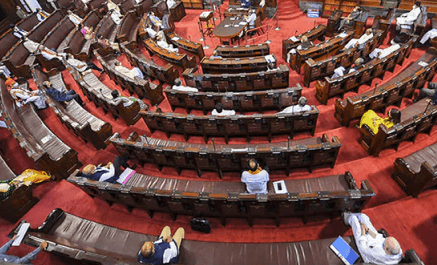General Information
Introduction

Parliamentary Committees play a vital role in the Parliamentary System. They are a vibrant link between the Parliament, the Executive and the general public. The need for Committees arises out of two factors, the first one being the need for vigilance on the part of the Legislature over the actions of the Executive, while the second one is that the modern Legislature these days is over-burdened with heavy volume of work with limited time at its disposal. It thus becomes impossible that every matter should be thoroughly and systematically scrutinized and considered on the floor of the House. If the work is to be done with reasonable care, naturally some Parliamentary responsibility has to be entrusted to an agency in which the whole House has confidence. Entrusting certain functions of the House to the Committees has, therefore, become a normal practice. This has become all the more neces...
Read More
Types of Committees
Rajya Sabha possesses an organised system of Committees. Appointments, term of office, functions and procedure for conducting business in these Committees are regulated under the provisions of the Rules and directions given by the Chairman from time to time. The Committees may be classified as Ad hoc Committees and Standing Committees.
Department-related Parliamentary Standing Committees
Out of the twenty-four Department-related Parliamentary Standing Committees of both the Houses, the following eight Committees function under the direction and control of the Chairman, Rajya Sabha: (a) Committee on Commerce (b) Committee on Home Affairs (c) Committee on Human Resource Development (d) Committee on Industry (e) Committee on Science and Technology, Environment and Forests (f) Committee on Transport, Tourism and Culture (g) Committee on Health and Family Welfare (h) Committee on Personnel, Public Grievances, Law and Justice The other sixteen Committees function under the direction and control of the Speaker, Lok Sabha.
Joint Parliamentary Committees (JPCs)
The Select/Joint Committees on Bills are constituted by the House(s) on specific motion moved by the Minister in-charge of the Bill or any member and adopted by the House to consider and report on Bills as referred to them from time to time. These Committees are distinguished from other ad hoc Committees, inasmuch as they are concerned with Bills and the procedure to be followed by them is laid down in the Rules of Procedure. They function under the directions and control of the Chairman.
Standing Committees
The second category of Committees, namely, Standing Committees may be divided in terms of their functions under four broad heads: 1. Committees to enquire— (a) Committee on Petitions; (b) Committee of Privileges; and (c) Ethics Committee. 2. Committees to scrutinise and control— (a) Committee on Government Assurances; (b) Committee on Subordinate Legislation; and (c) Committee on Papers Laid on the Table. 3. Committees relating to day-to-day business of the House— (a) Business Advisory Committee; and (b) Rules Committee. 4. House Keeping Committees— (a) House Committee; (b) General Purposes Committee; and (c) Committee on Provision of Computers to Members of Rajya Sabha. The functioning of all Standing Committees except the Committee on Provision of Computer Equipment to Members of Rajya Sabha and the Committee on MPLADS are governed by the Rules of Procedure and Conduct of Business in the Council of States.
Regulations for holding of elections to Committees/Statutory and other Bodies
Regulations for Holding Elections